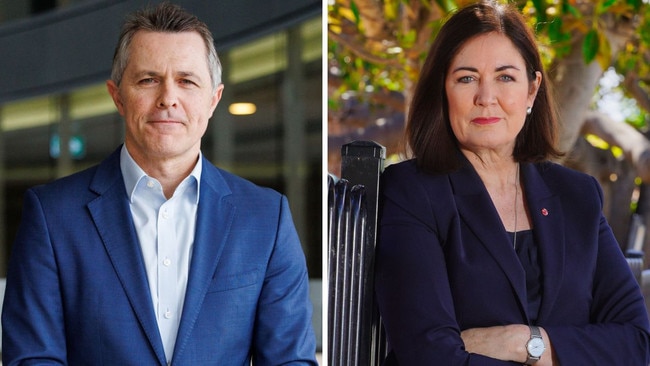
Federal Education Minister Jason Clare and his opposition counterpart Sarah Henderson made their election pitches at the Universities Australia conference in February. Overall, their core message is much the same: what we need is more government authority and less university autonomy.
But there is one big difference – while the Coalition talks tough on tighter controls, Labor wants a new agency that will regulate universities and stand between them and ministers when it comes to policy.
Clare has had two political objectives as minister. One is securing system support for his proposed centrally planned post-secondary system connecting higher education and training. The other is to neutralise the Greens, who always run hard on education, by promising more money for everything.
He accomplished the first by staying on three messages. One was that higher education should be managed by a new agency, the Australian Tertiary Education Commission, scheduled to start in mid-2025.
The second was that the economy needed more skilled workers, which he would deliver by funding more undergrads from low socio-economic circumstances. And the third was that because managements had let students and staff down, he had created the National Student Ombudsman, a code of conduct on sexual harassment and an advisory council on university governance. Plus he had neutralised the high cost of courses with a promised 20 per cut in existing HECS debts and lower indexation rates and higher thresholds for new ones.
And that looks like what he will run on.
His speech to UA was classic Whitlam, about education from preschool to university as driving social mobility and why Labor would deliver. “We are the best country in the world but we can be even better. And you are an indispensable part of making that a reality. Turning the country of our imagination into something real,” he said.
Henderson spoke to an academic audience at the UA event but the message was for her base: that universities needed to do a better job in putting Australian students first. “In everything you do, the 1.1 million Australian students you serve must be first and foremost,” she said. The take-out was many of them hadn’t, that big-city institutions had enrolled too many international students, let anti-Semites run riot on campus and paid managements way too much money. And while she said the government’s new regulator would not happen if she were the next minister, that was not because she wanted universities to self-regulate. Far from it; in government she and her department would do the overseeing.
Differences on other issues are mainly matters of degree:
• International students: Labor is reducing new enrolments. The Coalition says it will go selectively harder, pointing to universities in Sydney and Melbourne.
• Research: The Coalition created a new applied research program that Labor has continued – across government, research and development are what matters, rather than “blue sky” discoveries.
• Academic independence: Clare cancelled the ministerial veto on research grants (apart from national security). Henderson would reinstate it because “under our Westminster system of government, the buck stops with the government”.
• Cost of courses: a still-in-place Coalition policy means humanities, business and law students pay $17,000 a year via HECS; medicine, which is more expensive to teach, is $13,000. The government has done nothing about this in its first full term, leaving it to the proposed ATEC to consider. Henderson says the Coalition promised to review it after three years (losing the 2022 election stopped it) and will do so if it wins in 2025.
• Vice-chancellor pay: this is a natural for anybody not in government basically because, other than the Australian National University, universities are incorporated by state law. Clare has asked his new university governance council to consider processes “for developing remuneration policies”. Henderson floats vice-chancellor pay rates set by the federal Remuneration Tribunal.
• Anti-Semitism on campus: Henderson says there “will be zero tolerance”. Clare condemns it but has left it largely to agencies to address, which has not happened quickly.
â— Money: Clare is not specific, saying reforms in place and to come “add up to an extra $6.7bn injection … over the next decade”. Henderson mentions no number but says what the government’s needs-based funding stream means for universities is less clear.
But there is a difference when it comes to government control – between less autonomy for universities under the Coalition and much less from Labor. Clare says ATEC would “help drive and steer reform … break down the barriers between TAFE and university … provide advice on pricing and a lot more”. So much more that last year the Department of Education tried to grab control, presumably so it would have something to do. So much more that observers suggest ATEC could operate like the Commonwealth Grants Commission, which works independent of government to distribute GST revenue.
So far higher education lobbies generally like the idea of ATEC – assuming it will be their friend. But while ATEC’s operation will evolve across time it will be a gatekeeper with funding power, if not legislated authority, that stands between universities and ministers. And blurring, if not ending, the divide between vocational and higher education is already on its agenda – which status-conscious university leaderships loathe.
It is ATEC that makes the policy difference. Henderson certainly makes it clear she will not do a vindaloo in currying favour with vice-chancellors but she also says: “We see no compelling case to proceed with the ATEC because this is another layer of education bureaucracy at a significant cost.”
And a new bureaucracy is what Clare wants.




The election issue for universities is a choice between more, or much more, government control.